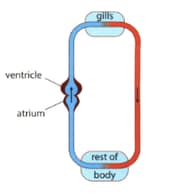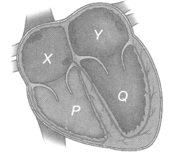Circulatory System
Important Questions on Circulatory System
State the difference between arteries and veins.
Differentiate between the veins and arteries.
The normal heart rate for an adult human is 60-100 beats per minute. Why does the heart rate vary among individuals?
The table shows the heart rate of a student before and after different types of exercise.
| Number of heart beats per minute | ||
| Before exercise | Just after exercise | |
| Exercise 1 | 92 | 135 |
| Exercise 2 | 88 | 105 |
| Exercise 3 | 90 | 155 |
| Exercise 4 | 92 | 115 |
Which exercise resulted in the maximum change in heart rate?
Which of these statements is correct?
Geeta measured the pulse rate of four students. The table below shows her findings.
| Pulse rate of the student (beats per minute) | |||
| 1st Reading | 2nd Reading | 3rd Reading | |
| Student 1 | 74 | 73 | 74 |
| Student 2 | 80 | 78 | 79 |
| Student 3 | 72 | 72 | 78 |
| Student 4 | 72 | 71 | 72 |
Geeta made an error in one of the readings. Which one is it most likely to be?
Geeta measured the pulse rate of four students. The table below shows her findings.
| Pulse rate of the student (beats per minute) | |||
| 1st Reading | 2nd Reading | 3rd Reading | |
| Student 1 | 74 | 73 | 74 |
| Student 2 | 80 | 78 | 79 |
| Student 3 | 72 | 72 | 78 |
| Student 4 | 72 | 71 | 72 |
Why did Geeta measure the pulse rate of each student thrice?
Geeta measured the pulse rate of four students. The table below shows her findings.
| Pulse rate of the student (beats per minute) | |||
| 1st Reading | 2nd Reading | 3rd Reading | |
| Student 1 | 74 | 73 | 74 |
| Student 2 | 80 | 78 | 79 |
| Student 3 | 72 | 72 | 78 |
| Student 4 | 72 | 71 | 72 |
Which student has the highest pulse rate?
Give one or two word answer for the following:
These are present in the blood and help the blood to clot.
Give one or two word answer for the following:
Lower organisms get oxygen directly through this process.
Write the name of the organs and the organ systems they are part of.

Every human being has the same composition of blood in their body. Then why do we need to check for blood groups before donating blood to someone.
Differentiate between auricles and ventricles.
Write four differences between arteries and veins.

The above diagram represents the circulatory system of aquatic animals. Identify the circulatory system. And also discuss how it differs from the circulatory system of mammals. How these differences could relate to the different requirements of an aquatic animal and a mammal.
Differentiate between arteries and veins.
Give three differences between RBCs and WBCs.
Refer to the given figure of heart and select the correct option.

Explain the difference between red blood cell and white blood cell.
The following statements show the discoveries made by different scientists around the world, as people tried to understand how the circulatory system works.
• William Harvey: An English doctor. He showed how valves in veins stopped blood flowing the wrong way. He predicted the existence of tiny blood vessels, linking arteries to veins.
• Galen: A Roman doctor. He showed that arteries contained blood. He thought that blood flowed through tiny holes in the heart from the right ventricle to the left ventricle.
• Erasistratus: A Greek doctor. When he dissected bodies, he found air in arteries and concluded that arteries carried air around the body.
• Ibn-al-Nafis: An Islamic doctor, born in modern-day Syria. He showed there were no holes in the middle of the heart, and thought that blood flowed from the right side of the heart to the lungs and then back to the left side. From here it was pumped around the body.
• Marcello Malpighi: An Italian doctor. He discovered capillaries, using a microscope.
Write the statements in the order in which they happened.

